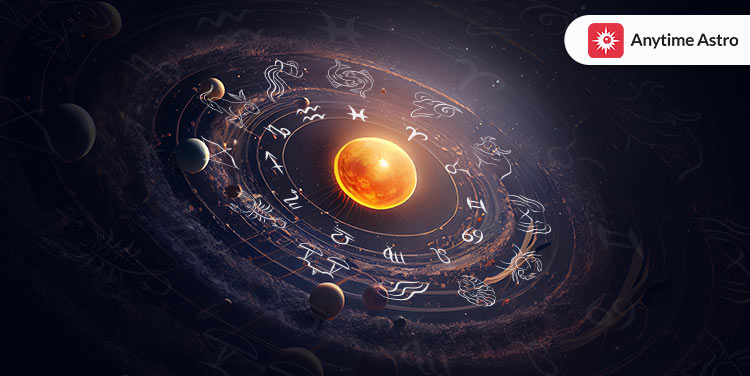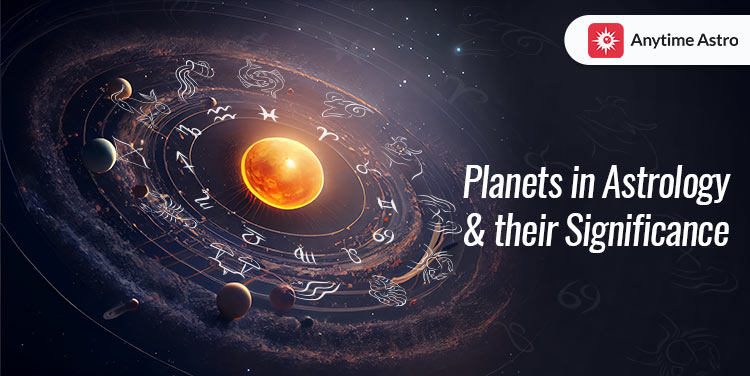The study of the nine planets in astrology helps to determine the horoscopes of individuals. Each of the planets holds a different attribute and has distinct influences and energies that impact the natives in a unique manner based on their birth charts. The personalities, life events, characteristics, and overall journey of an individual can be determined by the navagraha in Vedic Astrology, including the Sun and the Moon.
In this blog, we shall learn about the list of nine planets in astrology, their importance as well as the significance of each in an individual's life.
List of nav grah in Astrology
Let us uncover the meaning of all nine planets in astrology and determine what all aspects of our lives get impacted due to each planet -
Sun (Surya):
Sun is the center of our solar system. In astrology, the planet Sun is masculine and represents energy, self-expression, and core identity. Further, it depicts our willpower and individuality and is related to the Zodiac Sign Leo.
Moon (Chandra):
Being the closest to the Earth, the planet Moon in Astrology is regarded as the most effective planet in astrology. This planet of intuitions, emotions, and the subconscious mind, when placed in our birth chart, impacts our inner feelings, emotions, and nurturing abilities. It is a feminine celestial body and connected with the Zodiac Sign Cancer.
Mars (Mangala):
The planet Mars in astrology is related to action, passion, and vitality and represents ambition, courage, and the ability to take initiative. This planet governs our drive and physical strength and is associated with the zodiac signs Scorpio and Aries.
Mercury (Budha):
Being the planet of logic, intellect, and communication, Mercury governs the manner in which we process information, express ourselves, and adjust to our surroundings. Planet Mercury in astrology is related to the zodiacs Virgo and Gemini and plays a vital role in learning and decision-making.
Jupiter (Guru):
The Great Benefic planet Jupiter in astrology, signifying wisdom, growth, knowledge, and luck, presents the individuals with positive and broad influences. The placement of this planet in Kundali represents the opportunities and success we shall perceive, along with spiritual growth.
Venus (Shukra):
The planet Venus in astrology is associated with love, relationships, and beauty; and controls romance, aesthetic sense, and social interactions of an individual. This planet is associated with the Zodiac Signs Libra and Taurus and plays a substantial role in the pleasures and luxuries of the individual.
Saturn (Shani):
The planet Saturn in astrology is the task maker and represents responsibility, karma, and discipline. It depicts our karma, hard work, and life lessons and facilitates us to work towards our goals and be responsible for our lives. Saturn is associated with the Zodiac Aquarius and Capricorn.
Rahu:
Rahu is not a planet in astrology but a shadowy point, North Lunar Node. It holds a significant position and depicts the ambitions, desires, and worldly pursuits of an individual. Depending on the placement in the birth chart, Rahu can deliver both favorable and unfavorable outcomes.
Ketu:
Rahu's counterpart Ketu is known as the South Lunar Node in astrology and depicts detachment, spiritual growth, and past-life experiences. Based upon the placement of Ketu, the karmic lessons an individual should learn in a lifetime, can be studied.
Also See: Zodiac Sign By Date
Importance of Navagraha in Astrology
When you talk to astrologers to get your individual horoscope analyzed, they will tell you in detail how the planets are impacting your life. It is because the planets in astrology serve as a vital component in the birth chart. Let us learn more about it to comprehend the importance of planets in astrology -
- The planets in astrology reveals the individuals about the blueprint of their life journey by studying the planetary positions at the time of birth.
- It offers in-depth analysis of a person's personality, strengths, experiences, challenges, spiritual growth, and planets' effects on human lives.
- The placement of planets in astrology enables individuals to acquire a deeper understanding of themselves and their life paths.
- The placement of navagraha in Vedic astrology helps individuals make mindful choices and direct their actions with the cosmic forces for leading a successful life.

Read Also: list of Nakshatras
Significance of the Planets in Vedic Astrology
Next, let us know about the significance of each planet in vedic astrology:
Sun: The Sun represents one's core self, purpose, and recognition. In the birth chart, the planet Sun in astrology indicates self-confidence, creativity, and leadership abilities.
Moon: Moon manages the instincts, emotions, and intuition of individuals. The placement of the planet Moon in astrology reveals emotional needs, nurturing abilities, and adaptability an individual has.
Mars: In astrology, Mars is the planet of actions, passion and symbolizes power, energy, and courage. Based upon its placement in the birth chart, one can comprehend the risks, conflicts and pursue their goals.
Mercury: The planet Mercury in astrology impacts one's intellect, adaptability, and communication. Hence, its placement influences our problem-solving skills, learning abilities, and the manner in which we communicate.
Jupiter: The planet Jupiter in astrology represents growth and expansion and brings many growth opportunities to the individual. Its placement depicts spiritual growth, abundance, and success of the individual.
Venus: The planet Venus in astrology handles love, relationships, and material pleasures. Its placement indicates an individual's approach to love, aesthetics, and relationships.
Saturn: The planet Saturn in astrology teaches us valuable lessons and symbolizes karma, discipline, and responsibility. Its placement depicts the ability to abide by challenges, be mature, and discover life discourses.
Rahu: As Rahu, the shadow planet in astrology, symbolizes worldly pursuits and desires, its placement can lead to ambition and aspiration but might cause indecisiveness and obsessive behaviors among individuals.
Ketu: The shadow planet Ketu in astrology symbolizes separation, spiritual growth, and marks of past life. Its placement indicates karmic lessons an individual should learn to gain higher consciousness.
Also See: Free Daily Horoscope
Wrapping Up
The above-mentioned list of nine planets in astrology holds a significant role in shaping personalities, experiences, and growth, yet empowering individuals to make conscious choices, harness the potential to lead a fulfilling and purposeful life as well as navigating through the life challenges. All in all, astrology helps us to learn about the cosmic wisdom and the complexity of the human journey.





Leave a Comment